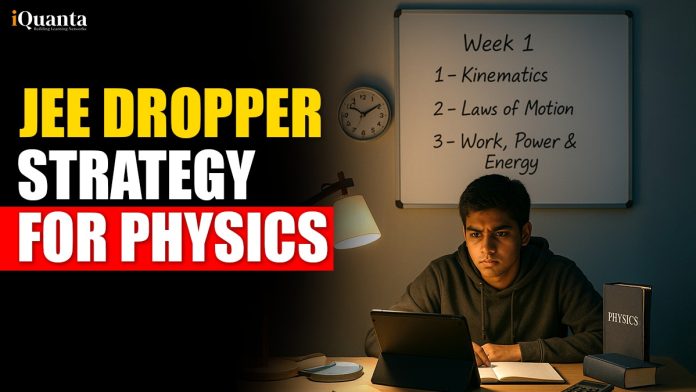For JEE droppers aiming to crack Physics in 2025, focused preparation and smart chapter selection are essential. With just 7 months, droppers must optimize their study time by prioritizing high-weightage chapters, solving PYQs, and also consistently attempting mocks. This strategy covers a two-phase approach- mastering important chapters first and followed by the rarely asked ones- along with expert-recommended books, daily/ weekly schedules, and mock test planning.
Whether you’re targeting JEE Main, Advanced, or both, this dropper-friendly Physics plan maximises scoring potential through data-backed priorities and also extensive practice.

Join this free JEE Prep Group to Get Free Study Material, Preparation Strategy by Toppers, Latest Updates and More!
Phase-Wise JEE Preparation Plan for 7 Months
| Phase | Duration | Focus Areas | Chapters | Strategy & Resources |
| Phase 1High-Yield Chapters & PYQs | First 4 Months | Cover 17 most important chapters contributing ~19–20 questions in JEE Main | Mechanics, Thermodynamics, Modern Physics, Current Electricity, Magnetism, SHM, Waves, etc. | – Solve chapter-wise PYQs from last 15 years- Learn through NCERT + HC Verma + DC Pandey- Build strong conceptual clarity |
| Phase 2Rarely Asked Chapters & Full-Length Practice | Last 3 Months | Revise less frequent 13 chapters (~5 questions in JEE Main)Practice full syllabus tests | Communication Systems, Semiconductors, Elasticity, Surface Tension, etc. | – Use Pathfinder (optional) for advanced problems- Solve mock tests & full-length papers- Focus on weak areas using video solutions & solved example |
JEE Main Physics Chapter-Wise Priority List (Based on Last 10 Years)
High Priority Chapters – Class 11
| Priority chapters | Class | Expected Qs |
| Thermodynamics | 11th | 1 to 2 |
| Fluid Mechanics | 11th | 1 to 2 |
| Rotational Motion | 11th | 1 to 2 |
| Work Power Energy | 11th | 1 to 2 |
| Units and Dimensions | 11th | 1 to 2 |
| Gravitation | 11th | 0 to 1 |
| Thermal Properties | 11th | 0 to 2 |
| Oscillations | 11th | 0 to 1 |
High Priority Chapters- Class 12
| Priority Chapters | Class | Expected Qs |
| Ray Optics | 12th | 2 to 3 |
| Electrostatistics | 12th | 1 to 2 |
| Magnetic Effects of Current | 12th | 1 to 2 |
| Current Electricity | 12th | 1 to 2 |
| Dual Nature | 12th | 1 to 2 |
| Capacitance | 12th | 0 to 1 |
| Semiconductors | 12th | 0 to 1 |
| Wave Optics | 12th | 0 to 1 |
| EM Waves | 12th | 0 to 1 |
These 17 chapter yield approximately 19- 20 questions out of 30 chapters in JEE Main.
Other 5 questions from remaining 13 chapters, to be done after preparing above 17 chapters.
JEE Advanced Chapter-Wise Priority List
P0 – Top Priority (50% of Paper)
- Ray Optics
- Electrostatics
- Rotational Motion
- Thermodynamics
- Fluid Mechanics
- Magnetic Effect of Current
- Waves and Sound
P1 – Medium Priority (30% of Paper)
- Motion in 2D
- Electromagnetic Induction (EMI)
- Nuclear Physics
- Wave Optics
- Units and Dimensions
- Current Electricity
- Alternating Current
- Capacitance
- Thermal Properties
P2 – Lower Priority (20% of Paper)
- Dual Nature
- Atomic Physics
- Oscillations
- Gravitation
- Experimental Physics
- Laws of Motion
Mandatory Chapters (interlinked with others):
- Center of Mass and Collision
- Work, Power, Energy
Class 11 & 12 Chapter Interlinkages in Physics
| Topics Connected from Class 11th | 12th chapters |
| Vectors | Complete book 1 (i.e electromagnatism) |
| Gravitation | Electrostatics |
| – | Current Electricity |
| – | Magnetism and EMI |
| SHM | AC |
| Wave Mechanics | EM Waves + Wave Optics |
| – | Ray Optics |
| Atomic Structure (Chemistry) | Modern Physics |
| – | Semiconductors (Only JEE Main) |
These interlinkages help in the conceptual reinforcement and faster revision.
Best Books for JEE Physics Preparation
| Book Name | Author / Publisher | Best For | Recommended For |
| Concepts of Physics (Vol 1 & 2) | H.C. Verma | Building strong conceptual clarity, numerical problem-solving | Both JEE Main & Advanced |
| Understanding Physics Series | D.C. Pandey (Arihant) | Chapter-wise theory + practice problems, objective-type questions | Both JEE Main & Advanced |
| Cengage Physics Series | B.M. Sharma | In-depth theory + wide range of solved/unsolved problems | Advanced-level aspirants |
| Pathfinder for Olympiad & JEE Advanced Physics | Arihant Publications | Very challenging conceptual & numerical problems | Selectively for JEE Advanced (Top 5000 rank aspirants) |
| Previous Year Questions (PYQs) | Any reliable publisher (Arihant, MTG, Disha, etc.) | Understanding JEE exam pattern and frequently asked concepts | Must for both JEE Main & Advanced |
JEE Physics Weekly & Daily Study Plan + Mock Test Strategy
| Aspect | Plan | Details |
| Total Weekly Study Time | Minimum 40 Hours | Includes concept learning, PYQs, problem-solving, and revision |
| Daily Schedule | Flexible | Divide time into:• Concepts (2–3 hrs)• Problem-Solving (3–4 hrs)• Revision (1 hr) |
| Weekly Targets | Fixed | • Complete 2–3 topics• Solve PYQs• Attempt 1 chapter-wise mock test• Analyze errors and revise weak areas |
| Monthly Mock Tests | Minor Mocks | • Unit-wise mock every month (e.g., Mechanics, Electrostatics, etc.) |
| Full Syllabus Mocks | Starts October | • Take 1 full-length mock test per week• Focus on time management & accuracy |
| Mock Test Platform | iQuanta JEE Test Series | • Chapter-wise & full mocks• AI-based analytics to identify weak areas• Tailored to JEE Main & Advanced level |
Mock Test Platform – iQuanta JEE Test Series
iQuanta’s JEE Test Series is a powerful tool for boosting your exam readiness through a targeted practice and also performance analysis. It includes:
- Chapter-wise and full-length mock tests
- AI-Based analytics for identifying and improving weak areas
- Tailored for both JEE Main and JEE Advanced difficulty levels.
- Performance tracking to help you build accuracy, speed and conceptual clarity over time.
Final Tips for Physics Success in JEE
- Cultivate the right mindset – consistent effort beats perfection.
- Focus on practice > theory – aim for 300+ problems per chapter.
- For tough chapters, start with solved examples to build base.
- Never skip any chapter – even 0–1 question topics can boost ranks.
Click Here to Enroll to JEE 2026 Course!

Frequently Asked Questions
Start with high-weightage chapters from PYQs, build conceptual clarity using HC Verma or DC Pandey, and solve 300+ problems per chapter for strong fundamentals.
PYQs help identify patterns and must be solved thoroughly, but for deeper understanding, combine them with mock tests, coaching modules, and reference books like DC Pandey or Pathfinder.
Ideally, 35–40 hours per week should be allocated for Physics, including concept revision, problem-solving, PYQs, and mock test practice with weekly analysis for improvement.




